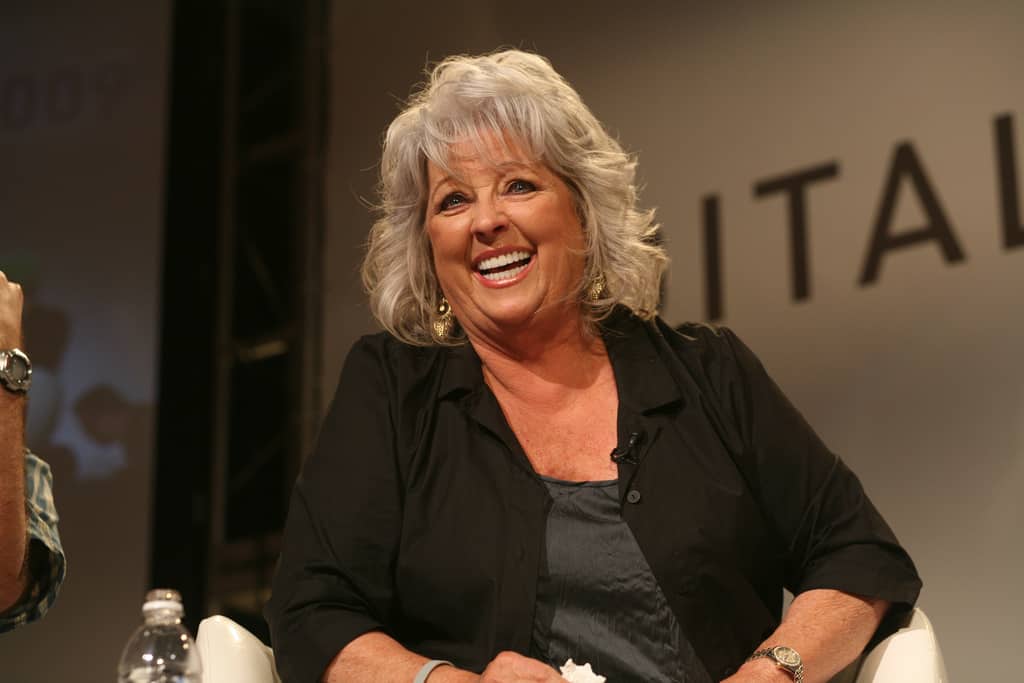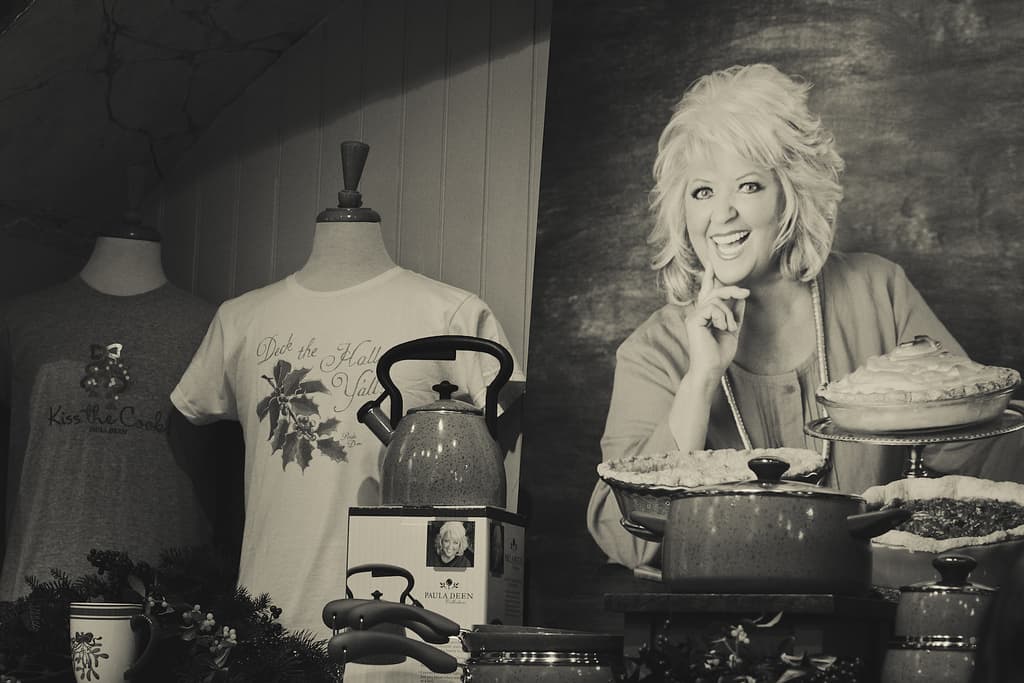I love to cook and I love to eat, and for this reason I love the Food Network. Or at least the parts of the Food Network that actually deal with cooking food. This love affair began back in college when, owing to my very basic cable subscription, Giada De Laurentiis was pretty much the only person on mid-afternoon television not related to a soap opera. These days I would watch the Food Network while at the gym, except I’m too afraid of being judged by the thin masses around me, you know, the ones who seem to subsist only on chicken breasts and air.
But for all my love of the Food Network (and despite the fact that one of my first pieces at TJP was about her) I have never been a fan of Paula Deen, the famed “Queen of Butter” – though, honestly, the title “Empress of All Lipids” would probably be more accurate. My reaction to her show roughly approximates my reaction to the food options at the New York State Fair. (Sure, there’s a certain voyeuristic pleasure in imagining what a deep-fried, bacon-wrapped banana tastes like, but inside all I can think is – and pardon my French – “Who would ever eat that shit?”)1
You also may remember that Ms. Deen has been in the news a lot in recent weeks, and is certainly putting the old maxim “all publicity is good publicity” to the test. The fracas centers on a lawsuit filed against Deen by two former employees alleging discrimination on the basis of race and sex in managing her restaurants. As part of a deposition taken in that case, Ms. Deen admitted that she had used the “N-word” word in the past (though she denies that she ever used it around the former employees who are suing her). She also admitted that, in planning a family wedding, she had wanted a southern plantation theme, with a waitstaff comprised exclusively of tuxedo-wearing African American men. She eventually decided against it for fear that it would be subject to ready misinterpretation. (Uh…you think?)
Deen has paid a steep price for her candor. After these admissions went public, her contracts with the following sponsors were revoked: Smithfield sausages, Target, Walmart, JCPenney, KMart, Home Depot, the list goes on. The diabetes drug maker Novo Nordisk also dropped her, and even the Food Network, the original engine of her fame, chose not to renew her contract at the end of June. Moreover, and despite multiple apologies, she has been pilloried in the comments of countless articles all over the internet.
What are we to make of all of this? So far as we know, Ms. Deen did not lie in the deposition, in fact she told the truth about her prior use of racially-charged language – even though it was impossible for her to come out looking good in such an admission. And, again, she has apologized repeatedly – whatever the motivations of that apology. I should note that these are pretty much the points made by former President Jimmy Carter made in speaking of the situation with CNN recently.2
If it sounds like I am being insufficiently hard on Ms. Deen, please wait just a moment longer before lighting up the comments section yourself. I’m not condoning the use of the “N-word.” I’m not apologizing for Deen’s use of it. I’m not saying she is innocent in the legal case against her. Nor, for that matter, am I advocating the “Avenue Q” approach to this situation, one that throws its hands up in the air and says (or is that sings?) “Everyone’s a little bit racist.”
In fact, much more than Paula’s plight itself, what fascinates me here is the public reaction to her confession. Check out this segment from The Daily Show, wherein Paula is viciously (and, I’ll admit, hilariously) skewered:
For even more up-to-date reactions, you might wander on over to #PaulasBestDishes on Twitter. Be warned, digital natives: it’s a jungle out there.
***
For my two dollars the most thought provoking response to this whole dustup was a partly sarcastic, partly sincere post on Food Network’s Facebook page. In fact, I have it for you right here:

***
First things first. I do not know you, Sue Fertig, but I just want to say before the whole internet: you’re a stronger person than I am. Whatever my outrage at this or future scandals, I am not sure I could walk away from “Barefoot Contessa” quite so decisively, even when Ina Garten is the subject of the scandal.
But what caught my eye in this octetly-liked-Facebook-comment is the invocation of the biblical story of the woman taken in adultery, a story which for all its renown appears only in the Gospel of John. You know the one: Jesus is in the temple area when the scribes and Pharisees haul before him a woman caught committing adultery (N.B.: the man in question is still at large). Noting that Mosaic law required that the woman be stoned, they then ask for Jesus’ opinion on what they should do. His famous response: “Let the one among you who is without sin be the first to throw a stone at her.” No stones flew that day, and after the crowd had dissipated, Jesus looked up and said to the woman: “Does no one condemn you? …Neither do I condemn you. Go, and from now on do not sin any more” (Jn. 8: 1-11).
Despite its title, I don’t think that Deen’s forthcoming book, Paula Deen’s New Testament, will offer an extended exegesis of this passage. (That said, I’d be fascinated to hear what she thinks Jesus was writing in the dirt while the crowd awaited his verdict. Maybe the recipe to her “Gooey Butter Cake”?) Perhaps it would make a good afterword.
But in this case, what has grabbed my attention is not so much a hypothetical encounter between Jesus and Paula Deen. What has stuck in my mind, especially following the reactions to Deen’s recent disgrace, is the rock-wielding crowd that is the protagonist in this parable. I wonder: where am I in this story? How long would it take me to walk away? Hell, in light of what I confessed about Paula Deen at the outset, would I walk away at all?
***
What I’m saying is, of course, not just about Paula Deen. It applies just as easily to anyone who’s been hauled onto the surgical table of public opinion, failings exposed under the surgical lamps, a public of indeterminate size greedily ringing the amphitheatre. No doubt we’ve all been the person exposed at some point or other. For good and for ill, I certainly have.
But more often, in my own case at least, I am likely to be one of those lurking in the shadows, idly pitching a stone from hand to hand, eagerly anticipating the first throw.
The parable Ms. Sue Fertig cited in her defense of Ms. Deen is as much (or more) about the people waiting to do the stoning as it is about the woman waiting for the rain of rocks to begin. These eleven verses hold a mirror up to my face – up to all of our faces – and ask what are you doing with that rock in your hand?
***
I love to cite that saying – let the one among you who is without sin cast the first stone – when I imagine myself in the woman’s shoes. That’s partly because of the overwhelming mercy of God, but also partly because I still get to hold on to my prized self-righteousness, even in a moment of great personal shame. There’s great, if illusory, satisfaction in hissing “oh, like you’re any better” to the crowd, crouching behind Jesus all the while.
How much harder to walk away. How much harder to admit – with the posture of our bodies, even, and in all humility – not just generic and indistinct sinfulness but our own accusatory hypocrisy made suddenly transparent in the light. And, it seems, the slow walk away, the releasing of the rock from our hands, is only made harder when the person we wish to stone is known to be guilty, whether of adultery or, I don’t know, using racist language.
***
In moments like these, I find myself pondering a very uncomfortable question: who or what did I go out there to stone in the first place? In other words, how much this is about the woman taken in adultery, really? Or, as I sit with my cursor blinking in the comment box of a story about Paula Deen, how much of what I want to write is truly about my sense of indignation that she used racial epithets?
More often, I fear, it’s about me. (It usually is, let me tell you.) And more often than I’m comfortable admitting, what I want to stone in “them” is a slim shadow of what I want to stone in myself.
What I deny to others in such situations – mercy, love, compassion – is exactly what I need the most.
— — // — —
- Editor’s note: mmmm…. ↩
- Though precisely why this situation required weigh-in from a former President is surely one of the lost secrets of Fatima. ↩



